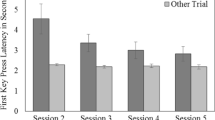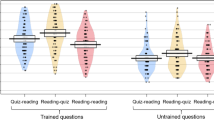Abstract
Practice tests and spaced study are both highly potent for enhancing learning and memory. Combining these two methods under the conditions in which they are most effective (i.e., practice tests that invoke successful retrieval from long-term memory and spacing study across days) yields a promising learning technique referred to as successive relearning. Given the obvious implications of successive relearning for promoting student learning and the voluminous literatures on testing and spacing more generally, surprisingly few studies have evaluated successive relearning, and none have done so in an authentic educational context. The two experiments reported here establish the potency of a successive relearning intervention for enhancing student learning by demonstrating meaningful improvements in course exam performance and on long-term retention tests.






Similar content being viewed by others
Notes
Based on our post-experiment scoring of participants’ responses, the accuracy of the responses that participants judged as completely correct across all RMF trials in all sessions was 89 % (SE = 2). The accuracy of responses participants judged as completely correct in “Experiment 2” was similar (M = 80 %, SE = 2).
Data collection for Experiment 1 occurred during a fall semester and in a spring semester for Experiment 2. Due to differences in the second half of the course schedule for these two semesters due to Spring Break and to some modifications the instructor made to course content later in the semester, we did not implement the full 14-session schedule in Experiment 2.
Based on analysis of the session dates in the program-internal data files, participants showed high levels of compliance with the intended schedule for Sessions 1–6, with an average of 2.4, 4.9, 2.2, 4.7, and 2.2 days (SEs = 0.2-0.4) between consecutive sessions (cf. the intended lags of 2, 5, 2, 5, and 2 days, as shown in Table 3).
References
Bahrick, H. P. (1979). Maintenance of knowledge: Questions about memory we forgot to ask. Journal of Experimental Psychology. General, 108, 296–308.
Bahrick, H. P., & Hall, L. K. (2005). The importance of retrieval failures to long-term retention: A metacognitive explanation of the spacing effect. Journal of Memory and Language, 52, 566–577.
Bahrick, H. P., Bahrick, L. E., Bahrick, A. S., & Bahrick, P. E. (1993). Maintenance of foreign language vocabulary and the spacing effect. Psychological Science, 4, 316–321.
Butler, A. C., & Roediger, H. L., III. (2007). Testing improves long-term retention in a simulated classroom setting. European Journal of Cognitive Psychology, 19, 514–527.
Carpenter, S. K., & DeLosh, E. L. (2006). Impoverished cue support enhances subsequent retention: Support for the elaborative retrieval explanation of the testing effect. Memory & Cognition, 34, 268–276.
Cepeda, N. J., Pashler, H., Vul, E., Wixted, J. T., & Rohrer, D. (2006). Distributed practice in verbal recall tasks: A review and quantitative synthesis. Psychological Bulletin, 132, 354–380.
Chan, J. C. K. (2009). When does retrieval induce forgetting and when does it induce facilitation? Implications for retrieval inhibition, testing effect, and text processing. Journal of Memory and Language, 61, 153–170.
Chan, J. C. K. (2010). Long-term effects of testing on the recall of nontested materials. Memory, 18, 49–57.
Corker, K. S., Oswald, F. L., & Donnellan, M. B. (2012). Conscientiousness in the classroom: A process explanation. Journal of Personality, 80, 995–1028.
Daniel, D. B., & Broida, J. (2004). Using web-based quizzing to improve exam performance: Lessons learned. Teaching of Psychology, 31, 207–208.
Deslauriers, L., Schelew, E., & Wieman, C. (2011). Improved learning in a large-enrollment physics class. Science, 332, 862–864.
Dunlosky, J., Rawson, K. A., Marsh, E. J., Nathan, M. J., & Willingham, D. T. (2013). Improving students’ learning with effective learning techniques: Promising directions from cognitive and educational psychology. Psychological Science in the Public Interest, 14, 4–58.
Fritz, C. O., Morris, P. E., Bjork, R. A., Gelman, R., & Wickens, T. D. (2000). When further learning fails: Stability and change following repeated presentation of text. British Journal of Psychology, 91, 493–511.
Glover, J. A. (1989). The “testing” phenomenon: Not gone but nearly forgotten. Journal of Educational Psychology, 81, 392–399.
Hartwig, M. K., & Dunlosky, J. D. (2012). Study strategies of college students: Are self-testing and scheduling related to achievement? Psychonomic Bulletin & Review, 19, 126–134.
Howe, M. J. (1970). Repeated presentation and recall of meaningful prose. Journal of Educational Psychology, 61, 214–219.
Karpicke, J. D., Butler, A. C., & Roediger, H. L., III. (2009). Metacognitive strategies in student learning: Do students practice retrieval when they study on their own? Memory, 17, 471–479.
Kay, H. (1955). Learning and retaining verbal material. British Journal of Psychology, 46, 81–100.
Kornell, N. (2009). Optimising learning using flashcards: Spacing is more effective than cramming. Applied Cognitive Psychology, 23, 1297–1317.
Kornell, N., & Bjork, R. A. (2007). The promise and perils of self-regulated study. Psychonomic Bulletin & Review, 14, 219–224.
Kornell, N., & Son, L. K. (2009). Learners’ choices and beliefs about self-testing. Memory, 17, 493–501.
Lyle, K. B., & Crawford, N. A. (2011). Retrieving essential material at the end of lectures improves performance on statistics exams. Teaching of Psychology, 38, 94–97.
McDaniel, M. A., Anderson, J. L., Derbish, M. H., & Morrisette, N. (2007). Testing the testing effect in the classroom. European Journal of Cognitive Psychology, 19, 494–513.
McDaniel, M. A., Wildman, K. M., & Anderson, J. L. (2012). Using quizzes to enhance summative-assessment performance in a web-based class: An experimental study. Journal of Applied Research in Memory and Cognition, 1, 18–26.
Mitchell, G. (2012). Revisiting truth or triviality: The external validity of research in the psychological laboratory. Perspectives on Psychological Science, 7, 109–117.
Pashler, H., & Harris, C. R. (2012). Is the replicability crisis overblown? Three arguments examined. Perspectives on Psychological Science, 7, 531–536.
Pyc, M. A., & Rawson, K. A. (2009). Testing the retrieval effort hypothesis: Does greater difficulty correctly recalling information lead to higher levels of memory? Journal of Memory and Language, 60, 437–447.
Pyc, M. A., & Rawson, K. A. (2011). Costs and benefits of dropout schedules of test-restudy practice: Implications for student learning. Applied Cognitive Psychology, 25, 87–95.
Rawson, K. A., & Dunlosky, J. (2011). Optimizing schedules of retrieval practice for durable and efficient learning: How much is enough? Journal of Experimental Psychology. General, 140, 283–302.
Rawson, K. A., & Dunlosky, J. (2012a). Relearning attenuates the benefits and costs of spacing. Journal of Experimental Psychology: General. doi:10.1037/a0030498.
Rawson, K. A., & Dunlosky, J. (2013). Bang for the buck: Supporting durable and efficient student learning. Submitted manuscript.
Rawson, K. A., & Dunlosky, J. (2012b). When is practice testing most effective for improving the durability and efficiency of student learning? Educational Psychology Review, 24, 419–435.
Roediger, H. L. I. I. I., & Karpicke, J. D. (2006). The power of testing memory: Basic research and implications for educational practice. Perspectives on Psychological Science, 1, 181–210.
Roediger, H. L., III, Putnam, A. L., & Smith, M. A. (2011). Ten benefits of testing and their applications to educational practice. Psychology of Learning and Motivation, 44, 1–36.
Shapiro, A. M., & Gordon, L. T. (2012). A controlled study of clicker-assisted memory enhancement in college classrooms. Applied Cognitive Psychology, 26, 635–643.
Spitzer, H. F. (1939). Studies in retention. Journal of Educational Psychology, 30, 641–656.
Szpunar, K. K., McDermott, K. B., & Roediger, H. L., III. (2008). Testing during study insulates against the buildup of proactive interference. Journal of Experimental Psychology. Learning, Memory, and Cognition, 34, 1392–1399.
Vaughn, K. E., & Rawson, K. A. (2011). Diagnosing criterion level effects on memory: What aspects of memory are enhanced by repeated retrieval? Psychological Science, 22, 1127–1131.
Vaughn, K.E., Rawson, K. A., & Dunlosky, J. (2013). Bang for the buck: Successive relearning beats initial criterion level. Paper presented at the 85th annual meeting of the Midwestern Psychological Association, Chicago, IL.
Vecchione, M., Alessandri, G., Barbaranelli, C., & Caprara, G. (2012). Gender differences in the Big Five personality development: A longitudinal investigation from late adolescence to emerging adulthood. Personality and Individual Differences, 53, 740–746.
Wissman, K. T., Rawson, K. A., & Pyc, M. A. (2011). The interim test effect: Testing prior material can facilitate the learning of new material. Psychonomic Bulletin & Review, 18, 1140–1147.
Wissman, K. T., Rawson, K. A., & Pyc, M. A. (2012). How and when do students use flashcards? Memory, 20, 568–579.
Author information
Authors and Affiliations
Corresponding author
Additional information
This research was supported by the Institute of Education Sciences, U.S. Department of Education, through Grant #R305A080316 to Kent State University. Opinions expressed are those of the authors and do not represent views of the Institute or the U.S. Department of Education.
Rights and permissions
About this article
Cite this article
Rawson, K.A., Dunlosky, J. & Sciartelli, S.M. The Power of Successive Relearning: Improving Performance on Course Exams and Long-Term Retention. Educ Psychol Rev 25, 523–548 (2013). https://doi.org/10.1007/s10648-013-9240-4
Published:
Issue Date:
DOI: https://doi.org/10.1007/s10648-013-9240-4




